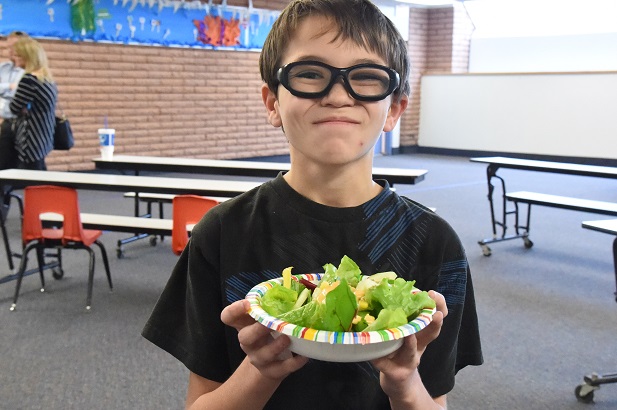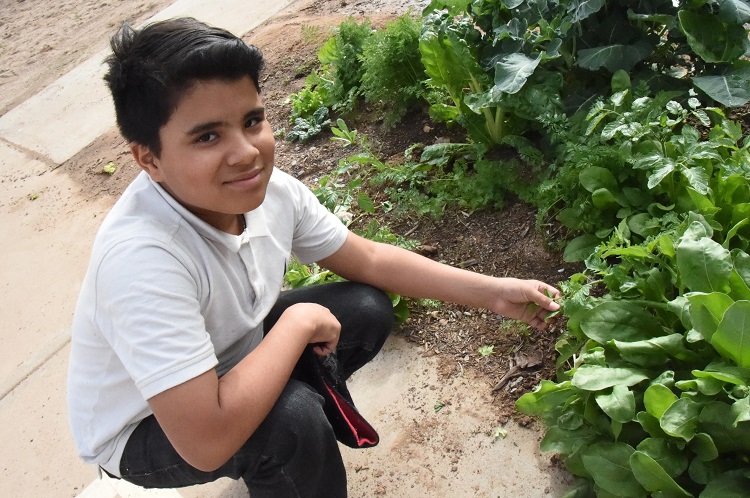
Can gardening help heal minds? This question has been pursued by doctors, psychologists and occupational therapists interested in a practice called horticultural therapy, the idea that planting and maintaining a garden can be a therapeutic process.
Many schools and rehabilitation clinics across the nation are offering youth programs which have implemented garden programs to promote horticultural therapy.
In 2011, a center elsewhere in the country showed that horticultural therapy within its gardening program helped participating kids better manage emotional and behavioral issues.
the Journal of Therapeutic Horticulture, most of the students participating also said they would continue gardening after the program.
In 2015, Evans Elementary, of the Tempe Elementary School District, reopened as Evans Learning Center.
Desert Choice Schools and Autism Spectrum Therapies, a Tempe-based clinic, share the space at Evans and provide educational, behavioral and emotional support to Tempe Elementary students.
Tempe Elementary instructional assistant Ruth Pulaski says she believes in the positive behavior that can be harvested from horticultural therapy.
This past summer, Pulaski joined together with Mary Bosen, city of Tempe Kid Zone employee and retired Tempe Elementary teacher, to kick off Evans Learning Center’s school garden program.
“I’ve always loved gardening and have seen the positive benefits of growing one,” said Pulaski. “The best thing I ever did was contact Mary to help me get one started here at Evans.”

To get the school garden concept growing in the right direction, Bosen and Pulaski sought help from Tempe as well as surrounding businesses. Walmart and The Home Depot donated store credit for the pair to buy supplies for building garden beds and irrigation. A&P Nursery in Mesa donated plants to the garden, and the city of Tempe donated seeds as well as a significant supply of compost.
“I so admire Tempe’s composting program,” said Pulaski. “The city truly believes in and provides support to school gardens.”
After tilling the soil and setting up the garden beds, Pulaski and Bosen introduced the garden to Evans’ students. The garden does not use any harsh insecticides or chemicals, ensuring an organic environment for students and staff to work in.
“The only thing these plants have had on them is water and compost,” said Bosen.
Students earn the opportunity to work in the garden by working on their behavior. Student Support Director Tracy Harvester explained that the Evans school garden has been a motivator for positive behavior with this group of students.
“Out of all the preferred activities that the students work toward, the school garden is the most popular choice,” said Harvester. “They’re learning life skills that they can take with them in the future, along with enjoying working with nature.”
“I love the garden because it’s a relaxing space,” said sixth-grader Serenity Grey. “I love to see the beautiful plants and eat yummy salads.”
Said seventh-grader Joel Chavez: “The radishes are my favorite; I really like how I saw them as seeds two months ago, and now they are fully grown.”
Sara Mauricio, who is Serenity and Joel’s teacher, reports she has seen a big difference in her students’ behavior thanks to the garden.
“The impact on motivation within the classroom has been outstanding,” said Mauricio. “They behave well so they can go out to the garden, and they come back feeling great. They also love eating their vegetables now.”
Joel explained that his time at Evans has been beneficial and he hopes he will be able to go back to his home-school, Gililland, from the behavioral progress he has made.
“My goal is to attend Gililland once again,” said Joel. “I will be writing a letter and hopefully get an opportunity to go back.”
To celebrate a successful first semester of gardening, Pulaski and Bosen organized an afternoon salad party to enjoy the fruits—or shall we say vegetables—of the school’s labor. Students and staff were invited to eat a garden-fresh salad of beet greens, lettuce, spinach, swiss chard and baby carrots, along with a variety of additional salad fixings.
One by one, students lined up and proclaimed how wonderful it was that they were eating vegetables straight from their own garden.
Desert Choice employee Ryan Alexander, who is a behavior teacher and PE coach at Evans, says he has seen the value of responsibility grow with his students in regards to the garden.
“The garden is a great way to teach responsibility to our students. They love to watch their plants grow and learn that hard work pays off.”

